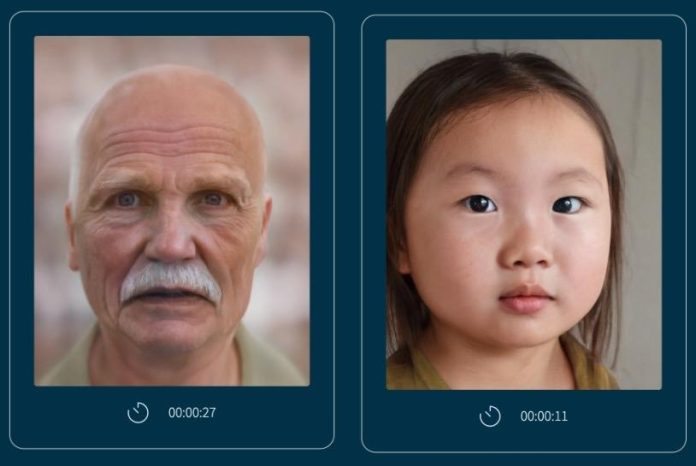An online quiz from software company iProov tasks you with deciding whether images and videos are … [+]
iProov collage by Leslie Katz
How vulnerable are you to being deceived by AI-generated photos and videos? A quick online quiz from London-based software company iProov lets you test your deepfake-spotting skills.
The quiz presents 10 images or videos of faces, one at a time, asking you to decide whether each is real or AI-generated. I confess to getting just 6 out of 10 right the first two times I took the quiz. On the third go, I slowed down and really studied the images, applying what I’d learned from my prior attempts — AI-generated people often have a certain odd sheen. This time, I scored 9 out of 10.
iProov, maker of biometric identity authentication products, launched the quiz alongside results of a study it conducted to gauge how well consumers fare when it comes to identifying deepfakes. Of the 2,000 U.K. and U.S. consumers polled, only 0.1 percent distinguished real from fake.
The survey results, announced Wednesday, come as deepfakes continue to proliferate online. This week, Scarlett Johansson called for a ban on deepfakes after her likeness appeared in a viral AI-generated video of Jewish celebrities condemning Ye for his latest string of antisemitic comments. “It is terrifying that the U.S. government is paralyzed when it comes to passing legislation that protects all of its citizens against the imminent dangers of AI,” Johansson said.
Though some observers praised the AI-generated video calling out Ye for its powerful message opposing hate speech, other deepfakes come with higher stakes. In an age when generative AI tools let anyone generate realistic-looking photos and videos using simple text prompts, it’s easy to to misrepresent the pope, presidents and just about anyone else. And once the fake digital cat’s out of the proverbial bag, only 11% of people critically analyze the source and context of information to determine if it’s real, the iProov study found.
Deepfakes also pose the danger of people claiming something they actually did is fake. Politicians, for example, can falsely claim that gaffes captured on camera are generated by artificial intelligence.
If you tagged this image as fake, you’d be correct.
iProov
Among the most alarming survey findings are that 22% of people have never heard of deepfakes, with that number rising to 39% among those 65 and older. With seniors already vulnerable to scams, the number highlights the enhanced susceptibility of senior adults to scams in an age of rampant misinformation. And despite the study results showing that only a fraction of consumers can spot a deepfake, 60% maintain false confidence about their deepfake-detection abilities.
“Even when people do suspect a deepfake, our research tells us that the vast majority of people take no action at all,” Andrew Bud, founder and CEO of iProov, said in a statement. “Criminals are exploiting consumers’ inability to distinguish real from fake imagery, putting our personal information and financial security at risk. It’s down to technology companies to protect their customers by implementing robust security measures.
As a company in the security and authentication spaces, iProov naturally has an investment in highlighting the perils of online deception. But the threats highlighted by its study are very real.




